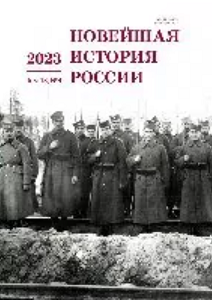О новейшей российской историографии советской этнонациональной политики: сюжеты, проблемы, идеи
The fate of the enlightenment figures of the Bashkir ASSR during the struggle against “bourgeois nationalism” (1937–1938)
Author(s): Dina AmanzholovaSubject(s): Political history, Nationalism Studies, Interwar Period (1920 - 1939)
Published by: Издательство Исторического факультета СПбГУ
Keywords: USSR; historiography; ethnonational policy; ethnicity; nation-building; interethnic integration; acculturation;
Summary/Abstract: The main attention is paid to the national historiography. The achievements of Russian historians are distinguished by an integrated approach, interdisciplinarity, professional analysis of unique sources, which makes it possible to reconstruct the process of implementing Soviet national policy in different ethnosocial environments, highlight similarities and differences on the example of individual national regions, provide a solid foundation for the creation of generalizing works and determining research prospects. In this regard, one of the controversial topics of modern historiography related to the interpretation of the concept of the “Soviet people” is also highlighted. The author notes that the early Soviet period is most intensively studied, when intensive na tion-building took place and the image of the Soviet Federation took shape. The most important ideas of scientists are highlighted, which analyze the essence, nature and details of federal construction, the organization of the transit of the multicultural, initially complex society of the USSR from tradition to modernity, the development of interethnic relations, state policy in ethnosocial and ethno-cultural fields, the activities of national leaders, personnel policy in national republics, ethno-oriented practices in different periods of Soviet history. The author emphasizes the actual meaning of the Soviet historical experience of the functioning of a multi-component state and interethnic consolidation, including during the Great Patriotic War, in order to solve modern problems of strengthening the civil unity of Russian society. Due to the need for a critical analysis of the “decolonial” discourse of foreign historiography, the author considers the study of socio-economic relations and interaction of national-state and administrative-territorial units of the USSR to be very relevant, both among themselves and in the context of the organizing and coordinating role of all-Union institutions. Some ideas are proposed to expand the subject field and problematize a wide range of debatable issues.
Journal: Новейшая история России
- Issue Year: 13/2023
- Issue No: 45
- Page Range: 990-1005
- Page Count: 16
- Language: Russian

